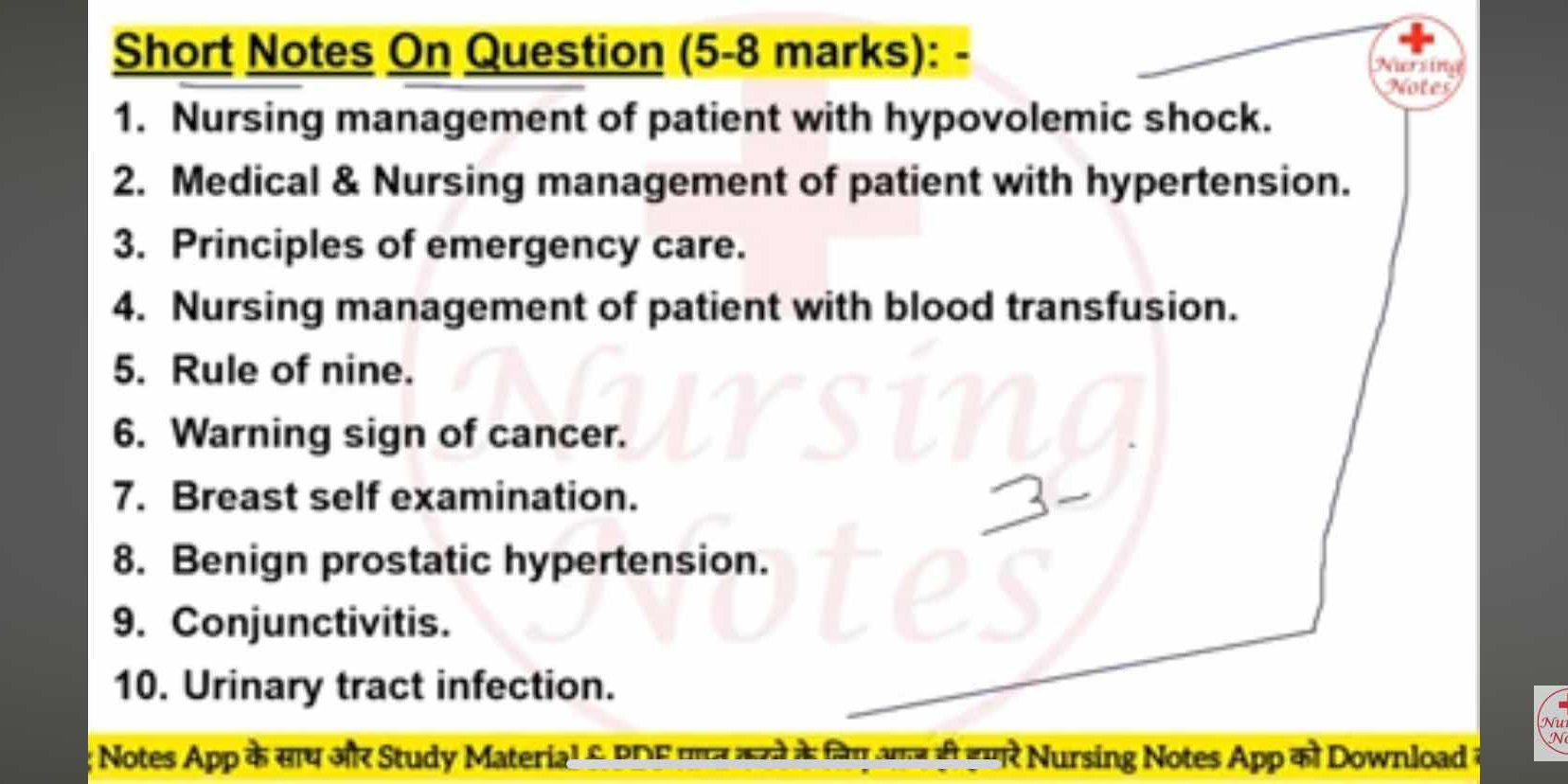Short notes on the following topics: 1. Nursing management of patient with hypovolemic shock. 2. Medical & Nursing management of patient with hypertension. 3. Principles of emergen... Short notes on the following topics: 1. Nursing management of patient with hypovolemic shock. 2. Medical & Nursing management of patient with hypertension. 3. Principles of emergency care. 4. Nursing management of patient with blood transfusion. 5. Rule of nine. 6. Warning sign of cancer. 7. Breast self-examination. 8. Benign prostatic hypertension. 9. Conjunctivitis. 10. Urinary tract infection.

Understand the Problem
The question is asking for notes or summaries related to specific nursing topics, likely for study or exam preparation.
Answer
Short notes cover management strategies, principles of care, and diagnostic methods for given medical conditions.
-
Nursing Management of Hypovolemic Shock: Monitor vital signs, administer IV fluids, ensure oxygenation, and monitor for changes in mental status.
-
Medical & Nursing Management of Hypertension: Lifestyle changes, medication compliance, regular BP monitoring, education on risk factors, and dietary management.
-
Principles of Emergency Care: Rapid assessment, prioritization of life-threatening conditions, immediate intervention, and ensuring patient safety.
-
Nursing Management of Blood Transfusion: Verify compatibility, monitor for transfusion reactions, assess vital signs pre and post transfusion.
-
Rule of Nine: Used to estimate burn surface area; divides body into sections representing 9% or multiples of 9%.
-
Warning Signs of Cancer: Changes in bowel habits, a sore that does not heal, unusual bleeding, thickening/lump, indigestion, cough/hoarseness, and changes in a mole.
-
Breast Self-Examination: Monthly self-check during menstruation’s end; look for lumps, changes in size or shape, and any discharge from nipples.
-
Benign Prostatic Hypertension: Asymptomatic or urinary retention; manage with medications or surgical intervention if needed.
-
Conjunctivitis: Redness, itching, and tearing; treated with hygiene and sometimes antibiotics.
-
Urinary Tract Infection: Frequent urination, burning sensation; managed with antibiotics, hydration, and proper hygiene.
Answer for screen readers
-
Nursing Management of Hypovolemic Shock: Monitor vital signs, administer IV fluids, ensure oxygenation, and monitor for changes in mental status.
-
Medical & Nursing Management of Hypertension: Lifestyle changes, medication compliance, regular BP monitoring, education on risk factors, and dietary management.
-
Principles of Emergency Care: Rapid assessment, prioritization of life-threatening conditions, immediate intervention, and ensuring patient safety.
-
Nursing Management of Blood Transfusion: Verify compatibility, monitor for transfusion reactions, assess vital signs pre and post transfusion.
-
Rule of Nine: Used to estimate burn surface area; divides body into sections representing 9% or multiples of 9%.
-
Warning Signs of Cancer: Changes in bowel habits, a sore that does not heal, unusual bleeding, thickening/lump, indigestion, cough/hoarseness, and changes in a mole.
-
Breast Self-Examination: Monthly self-check during menstruation’s end; look for lumps, changes in size or shape, and any discharge from nipples.
-
Benign Prostatic Hypertension: Asymptomatic or urinary retention; manage with medications or surgical intervention if needed.
-
Conjunctivitis: Redness, itching, and tearing; treated with hygiene and sometimes antibiotics.
-
Urinary Tract Infection: Frequent urination, burning sensation; managed with antibiotics, hydration, and proper hygiene.
More Information
These notes provide an overview of nursing interventions and basic medical management for common conditions and assessments.
Sources
- Hypovolemic Shock Nursing Care Plans - Nurseslabs - nurseslabs.com
- Conjunctivitis - Mayo Clinic - mayoclinic.org
- Urinary Tract Infection - Mayo Clinic - mayoclinic.org
AI-generated content may contain errors. Please verify critical information